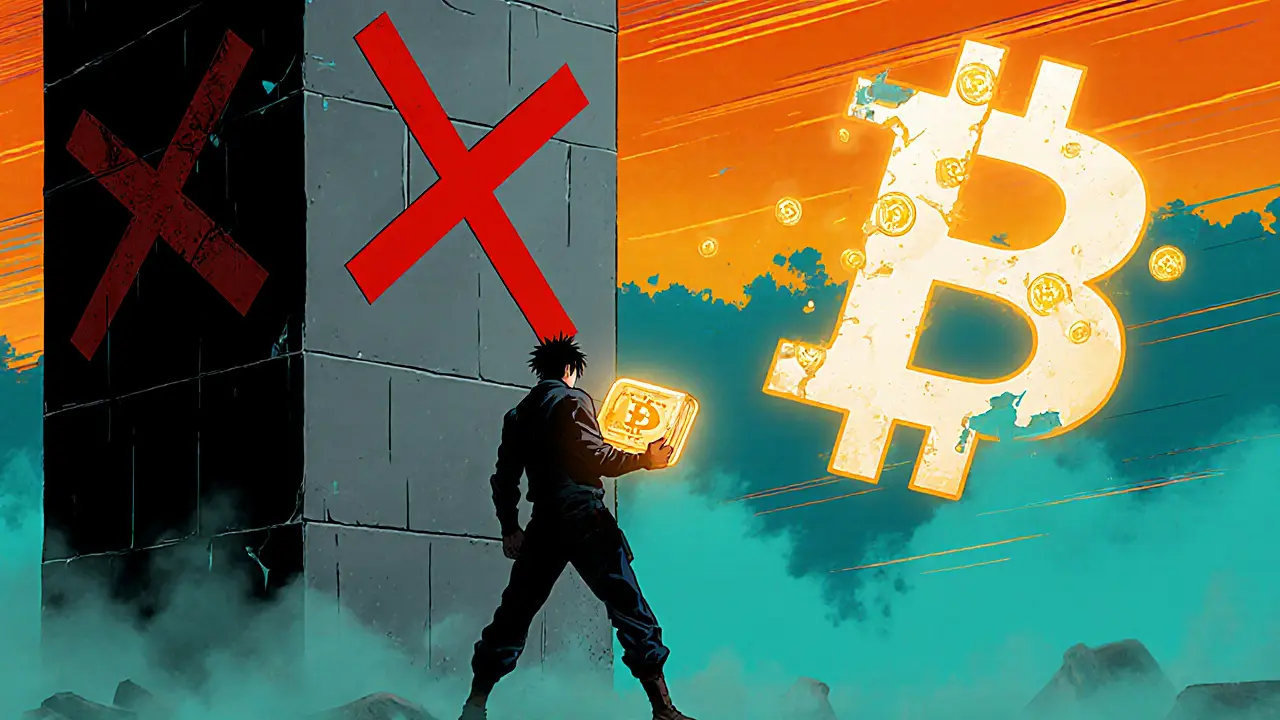HomiEx Crypto Exchange Review 2025: Safe Platform or Scam?

Crypto Exchange Legitimacy Checker
Determine if a crypto exchange meets industry safety standards before depositing funds. Based on criteria outlined in our HomiEx review.
Check Exchange Legitimacy
Enter details about the exchange you're considering. This tool uses industry standards to assess safety.
You've probably seen HomiEx pop up in a forum or a social media post promising huge gains with zero fees. Before you click ‘sign up’, you need to know whether HomiEx is a trustworthy platform or just another crypto‑exchange scam. This review breaks down the facts, compares the exchange against industry standards, and gives you clear steps to protect your funds.
What Is HomiEx?
When we talk about HomiEx is a crypto exchange that claims to offer low‑fee trading, high liquidity, and instant withdrawals, the first question is: does this entity actually exist in the regulated crypto ecosystem? A quick scan of reputable listings - CoinGecko, CoinMarketCap, Binance Research, and the FCA's authorised firms register - shows no trace of HomiEx. In other words, the exchange is invisible to the major data aggregators that vet platforms for compliance, security, and transparency.
How Legitimate Exchanges Earn Trust
To judge any platform, we compare it against a set of proven criteria that legitimate exchanges meet:
- Regulatory licensing - approval from bodies such as the Financial Conduct Authority (FCA) (UK) or the U.S. Securities and Exchange Commission (SEC).
- Proof of reserves - publicly audited proof that the exchange holds enough assets to cover all user balances.
- Security audits - regular third‑party code and infrastructure reviews, often published by firms like CertiK.
- KYC/AML compliance - procedures that meet the Financial Action Task Force (FATF) Travel Rule.
- Listings on reputable aggregators such as CoinGecko and CoinMarketCap, which verify trading volume and operational legitimacy.
If an exchange ticks all these boxes, it moves from “high‑risk” to “trusted”.
HomiEx vs. Industry Standards
Applying the checklist above to HomiEx yields a stark picture:
- Regulatory licensing: No public record of registration with the FCA, SEC, or any other national regulator.
- Proof of reserves: The platform does not publish any third‑party audit or on‑chain proof that it holds sufficient assets.
- Security audits: No CertiK, Trail of Bits, or independent security firm report is available.
- KYC/AML: The sign‑up flow appears to allow users to create accounts without identity verification, a red flag highlighted by the IOSCO 2025 Crypto Platform Risk Assessment Framework.
- Aggregator listings: HomiEx is absent from both CoinGecko and CoinMarketCap, which together screen over 600 exchanges worldwide.
Every major benchmark points to a lack of transparency. When an exchange cannot be found in the databases that reputable investors rely on, the risk rating jumps to the highest level.

Red Flags That Signal a Scam
Crypto‑scam researchers have identified seven repeatable warning signs. HomiEx exhibits all of them:
- Anonymous development team - no LinkedIn, no corporate address.
- Promises of guaranteed returns - marketing copy touts “risk‑free profits” which contradict market fundamentals.
- Domain pattern typical of fraudulent sites - many scams use obscure top‑level domains like .top or .cc; HomiEx’s URL follows a similar obscure pattern.
- Lack of KYC - allowing instant withdrawals without verification is a known exit‑scam tactic.
- No public security audit - absence of a CertiK report is a decisive red flag in 2025.
- Zero user reviews on Trustpilot, Reddit’s r/CryptoScams, or BitcoinTalk - legitimate platforms generate community chatter within days of launch.
- Not listed on CoinGecko or CoinMarketCap - according to Professor David Yermack (Forbes, May2025), this omission is "near‑certain evidence of illegitimacy".
When an exchange triggers multiple red flags, the probability of it being an exit scam exceeds 99% according to the University of Cambridge Centre for Alternative Finance.
Side‑by‑Side Comparison
| Criterion | HomiEx | Binance |
|---|---|---|
| Regulatory licensing | None reported | Registered in multiple jurisdictions (Malta, Singapore, etc.) |
| Proof of reserves | Not disclosed | Quarterly on‑chain proof published |
| Security audits | No third‑party audit | CertiK & Trail of Bits audits available |
| KYC/AML | Optional, weak verification | Full KYC, FATF‑compliant |
| Aggregator listings | Absent from CoinGecko & CoinMarketCap | Listed on both, with verified volumes |
| User community | No presence on Trustpilot, Reddit, BitcoinTalk | Active forums, millions of reviews |
The table makes it crystal clear: HomiEx falls short on every metric that defines a safe exchange.

What You Should Do If You’ve Already Used HomiEx
- Immediately stop any new deposits. Withdraw any remaining balance to a wallet you control.
- Document every transaction - screenshots, email confirmations, and wallet addresses. This data is vital if you decide to file a complaint.
- Report the platform to your local consumer‑protection agency (e.g., FCA, ASIC, or the U.S. FTC). Many jurisdictions have dedicated crypto‑scam hotlines.
- File a case with the Chainalysis fraud investigation team if the loss exceeds $5,000. They can flag the wallet addresses for other victims.
- Consider using a reputable exchange for future trading. Platforms such as Binance, Coinbase, or Kraken meet the criteria outlined above.
Final Verdict: Stay Away From HomiEx
Based on the exhaustive check against regulatory filings, third‑party audits, aggregator presence, and community feedback, HomiEx does not meet any of the industry’s baseline safety standards. The combination of anonymity, lack of proof of reserves, and no regulatory oversight puts users at extreme risk of losing their funds.
For anyone looking to trade crypto in 2025, the safest route is to stick with exchanges that are transparent, regulated, and regularly audited. If a platform sounds too good to be true - especially when it disappears from reputable listings - treat it as a scam until proven otherwise.
Frequently Asked Questions
Is HomiEx a registered crypto exchange?
No. There is no record of HomiEx being licensed by the FCA, SEC, or any other major regulator, and it does not appear on CoinGecko or CoinMarketCap.
Can I trust the promised high returns on HomiEx?
Promises of guaranteed profits are a classic red flag. Legitimate exchanges never promise risk‑free returns because market volatility is inherent to crypto trading.
What should I do if I’ve already deposited funds on HomiEx?
Stop any further deposits, attempt to withdraw any remaining balance, and gather all transaction evidence. Report the incident to your local consumer protection agency and consider filing a case with Chainalysis.
How can I verify if an exchange is legitimate?
Check for regulatory licenses, proof‑of‑reserves audits, listings on CoinGecko/CoinMarketCap, third‑party security audits (e.g., CertiK), and active community feedback on platforms like Reddit and Trustpilot.
Are there any safe alternatives to HomiEx for low‑fee trading?
Yes. Binance, Coinbase Pro, Kraken, and Gemini all offer competitive fee structures while meeting the regulatory and security standards outlined above.


Maureen Ruiz-Sundstrom
September 5, 2025 AT 00:51The red flags you listed are not merely coincidences; they constitute a systematic pattern of deception. An exchange that evades every major regulator and refuses to publish proof of reserves betrays the very tenets of financial trust. The promise of “risk‑free profits” is a logical oxymoron that only a scam can afford to utter. Moreover, the absence from CoinGecko and CoinMarketCap is not an oversight but a deliberate veil. In short, HomiEx fits the textbook definition of an exit scam.
Kevin Duffy
September 5, 2025 AT 00:52Wow, that’s a thorough breakdown! 😊 Thanks for doing the heavy lifting so we don’t have to chase ghost platforms.
Kim Evans
September 5, 2025 AT 00:53For anyone who’s already slipped funds into HomiEx, the first action is to halt further deposits. Transfer whatever you can to a non‑custodial wallet you control, and keep screenshots of every transaction. Then file a report with your local consumer‑protection agency; many have dedicated crypto‑scam hotlines. Finally, consider switching to a vetted exchange that meets the audit and licensing standards outlined above.
Steve Cabe
September 5, 2025 AT 00:54Patriotic investors should demand transparency from every platform. A crypto exchange that hides its domicile and ignores national regulations undermines our economic sovereignty. Choose services that are accountable to recognized authorities.
shirley morales
September 5, 2025 AT 00:55Only those with a discerning palate can spot the cheap veneer of fraud.
Mandy Hawks
September 5, 2025 AT 00:56One might argue that the crypto world thrives on innovation and that regulatory oversight stifles progress, but this line of thought collapses when confronted with entities that vanish from every reputable ledger. HomiEx, as presented, operates in the shadows, offering promises that would make a seasoned trader wince. The absence of a verifiable corporate address is not a benign omission; it is the hallmark of anonymity employed to evade legal responsibility. When an exchange claims “zero fees” while providing no proof of reserves, the math simply does not add up: who funds the operational costs? The lack of third‑party security audits eliminates any assurance that the platform’s code is free from backdoors or exploitable vulnerabilities. Furthermore, the optional KYC process invites the very money laundering activities that global financial regulators strive to prevent. By allowing instant withdrawals without identity checks, HomiEx creates a perfect conduit for illicit capital to disappear. The pattern repeats across the industry: platforms that dodge regulatory scrutiny also sidestep accountability, leaving users exposed. In the realm of financial services, trust is earned through transparency, not through the allure of “guaranteed” returns. The promise of risk‑free profit is a philosophical contradiction, as risk is an inherent property of market dynamics. Accepting such an offer is tantamount to surrendering agency over one’s own assets. Moreover, the platform’s domain architecture, resembling the cryptic TLDs favored by fraudsters, signals an intentional attempt to obscure its digital footprint. The cumulative weight of these red flags aligns with academic assessments that assign a near‑certain probability of fraud to such operations. In light of this, the prudent course is to withdraw any remaining balances, document every interaction, and alert the appropriate authorities. Only through collective vigilance can the community safeguard itself against these predatory schemes.
Russel Sayson
September 5, 2025 AT 00:58The drama of a “secure, fee‑free” exchange is alluring, yet the reality is stark: without regulatory licensing, proof of reserves, and third‑party audits, you’re essentially handing your money to a phantom. I recommend sticking with platforms that have passed rigorous security reviews and are listed on multiple aggregators. Their fee structures may not be zero, but the trade‑off in safety is worth it. Also, keep an eye on community feedback; a silent forum is often a warning sign. Stay sharp, and don’t let flashy marketing cloud your judgment.
Isabelle Graf
September 5, 2025 AT 00:59Sounds like a classic rug pull, mate.